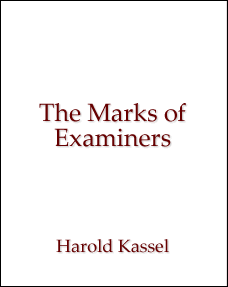|
New Book Coming Soon!
|
My forthcoming book The Marks of Examiners will be about the absolute power of college and university faculty members because of the authority to subjectively evaluate students, and the consequences this has for education and a democratic society. The following is an excerpt from my first book Economics as a Symptom of Sadism which briefly addresses this topic:
Censorship in the university may seem quite at odds with the image of an institution of higher learning. Professors, especially tenured ones, can write on almost everything and do write books and papers which might seem quite controversial or sometimes counterculture. The reason, though, people don't think of censorship in the university is that they don't think about students, especially graduate students. The university is like something under a rock. Graduate faculty may have paternal thoughts about students or more likely they may think of students as a necessary inconvenience, as people to dominate and impress, as a rabble, or as not yet formed and of no standing. Perhaps students are thought of as being like a manikin in a science fiction movie, a manikin that is spun around and around on a circular platform until it becomes a predetermined, programmed man, except the students may be viewed as a threat and potential competition, so the graduate faculty members may not want them to become men. The more that get through the less elite is the degree. Or perhaps it is more like pseudo-speciation in which a member of the same species is viewed as though he were a member of a different species. All these attitudes are not constructive or intelligent ways to relate to graduate students. Intelligence is a variable in behavior too. But I think the public does not think of graduate students at all.
I can imagine someone saying incredulously, "Do you mean all professors are like that?" He thinks if he can catch me generalizing, he can one up me and be somebody. I would say the attitude I described is fairly typical and whether it is characteristic of all is quite irrelevant.
When in this book I cite a disagreement with the view of a professor, I will often say it would be risky for a student to question a professor's cherished beliefs in class or in a written assignment. Well, aren't universitites ivory towers where people seek the truth? I am afraid not, at least not in the humanities and social sciences. Graduate faculty members are often petty tyrants, not necessarily very intelligent, very invested in their viewpoints, and easily threatened. They do not like to be questioned or challenged. They have absolute power that can be arbitrarily exercised. The basis of this power is the license to evaluate students subjectively through term papers, essay exams, master's papers, and doctoral dissertations. There is an alternative, and I don't mean lowering standards.
Even though there may be benign instructors, I have never seen a graduate faculty member I would take the chance of questioning, if the question might be interpreted as a challenge. Questioning another student with a faculty member present also just isn't done. It might make him look inadequate and the question might antagonize the instructor. Education is severely limited by these constraints. The instructor doesn't encounter views which conflict with his own, or of which he had not conceived, and neither do other students. That means discussion can't take place, issues can't be explored, and there is no forum. Millions of students are in universitites, and there is no forum. Universities from the point of view of graduate students are the most totalitarian institutions in this country.
Consider that the student's chance of entering a profession and, in a sense, his whole life depends on the graduate degree. He won't take a risk. Who would? That must be obvious but never stated, never faced. Students who have gone through graduate programs are aware to a degree of the pressure for conformity but accept it. It's the system. Some students are really indifferent to the viewpoint of any teacher or reading. They just want a degree. Perhaps for them it is easiest. So I will write about censorship in the media and in universities. I will document the censorship in the universities by some telling examples.
